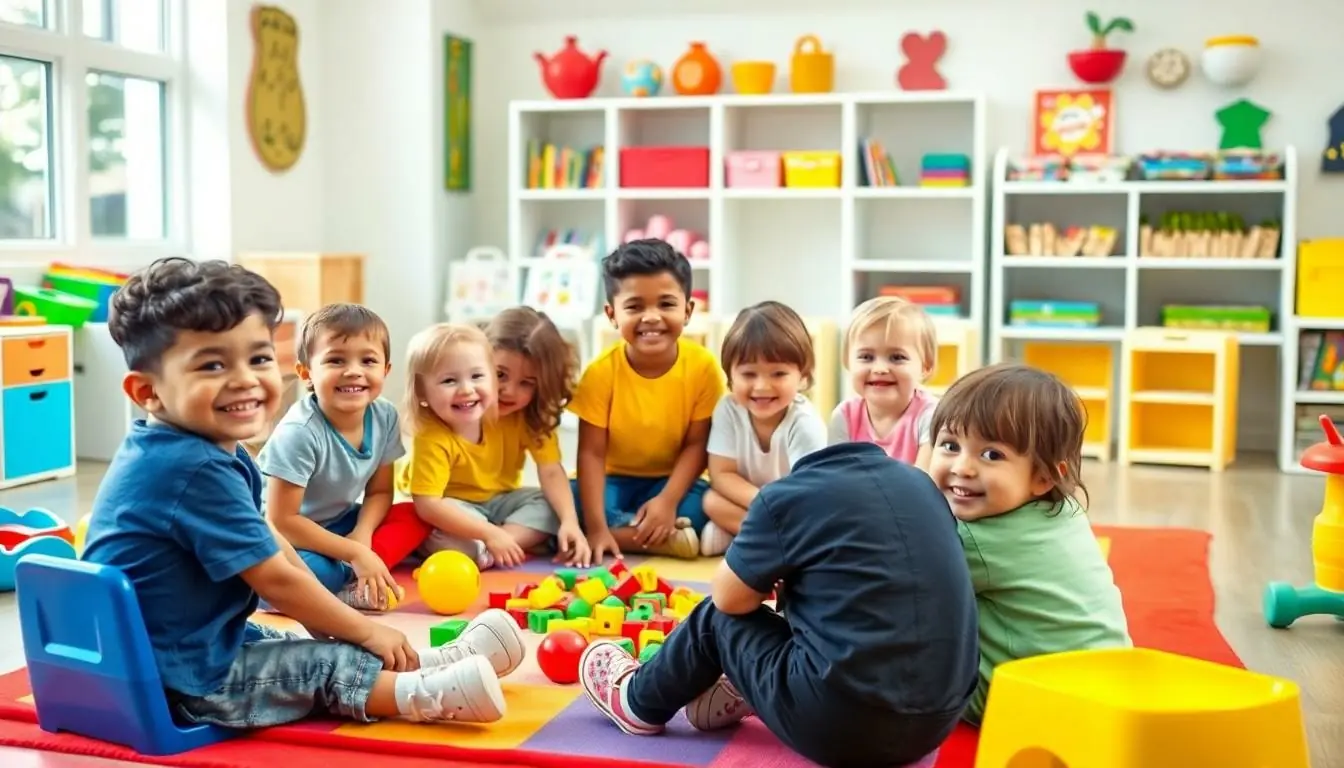Table of Contents
ToggleAs parents ponder the big question—”Is preschool required?”—they often find themselves in a whirlwind of opinions, statistics, and the occasional unsolicited advice from well-meaning relatives. Some say preschool is essential for social skills, while others argue that a cozy home environment does just fine. It’s like trying to decide between chocolate and vanilla ice cream—both have their merits, but one might just make you feel like a rockstar.
Understanding Preschool
Preschool offers early childhood education for children typically aged three to five. This setting prepares kids for a smoother transition to kindergarten.
What Is Preschool?
Preschool is an educational environment focused on teaching foundational skills. Children engage in structured activities, enhancing their cognitive, social, and emotional development. Programs often include various instructional approaches like play-based learning and teacher-led activities. Each preschool varies in curriculum, yet most emphasize essential areas such as language development, motor skills, and problem-solving.
The Purpose of Preschool
The primary purpose of preschool is to provide early learning experiences. Children gain social skills through interactions with peers and teachers. These interactions foster cooperation and communication. Preschool also instills a love of learning, encouraging curiosity and exploration. Programs aim to prepare children for the academic demands of kindergarten while addressing their emotional and social needs. Engaging in these foundational experiences ultimately supports a child’s overall development.
Benefits of Preschool
Preschool offers numerous advantages that promote a child’s development in key areas. Understanding these benefits helps parents make informed decisions about their child’s early education.
Social Development
Social development thrives in preschool environments. Children interact with peers, learning to share, cooperate, and navigate social dynamics. Engaging in group activities fosters communication skills and builds friendships. Additionally, structured settings help children understand boundaries, encouraging respect for others. Through play and collaboration, kids gain confidence in expressing their thoughts and feelings. Learning to resolve conflicts works as another critical aspect of this stage. Overall, preschool lays a strong foundation for future social interactions and relationship-building.
Academic Readiness
Academic readiness begins early for children enrolled in preschool. Exposure to a structured educational environment enhances early literacy and numeracy skills. Engaging in activities like storytime stimulates language development, while counting games introduce basic math concepts. Children develop critical thinking skills through problem-solving tasks and hands-on learning. Research indicates that preschool graduates often perform better in kindergarten and beyond compared to those without formal early education. Early learning experiences shape a child’s attitude towards education, creating lifelong learners.
Arguments Against Mandatory Preschool
Arguments exist against mandatory preschool, with various considerations influencing this viewpoint.
Financial Considerations
Preschool tuition can significantly strain family budgets. Many families face high costs, which may limit access to early education for some children. Public preschool programs often provide solutions, yet these options may lack sufficient funding and availability. Additionally, parents might prioritize their spending more on childcare or other educational resources for children, resulting in alternate decisions about early education. Families with multiple children experience greater financial pressures, making mandatory preschool less feasible.
Alternative Learning Paths
Home environments often serve as effective alternatives to preschool education. Parents can provide learning opportunities through everyday activities including reading, cooking, and nature walks. Various community programs, playgroups, and family outings also support socialization and development. Alternative methods, such as Montessori or homeschooling, cater to individual learning styles while promoting academic growth outside formal preschool settings. Many cultures emphasize familial learning, challenging the idea that preschool is the only option for early childhood education.
Perspectives from Educators and Parents
Educators and parents share valuable perspectives on the necessity of preschool, shaping how the debate evolves. These viewpoints often reflect personal experiences and broader societal trends.
Educator Insights
Educators frequently highlight the importance of preschool for early development. They point to structured environments that promote social skills as essential for young children. Instructional methods, such as play-based approaches, engage children in meaningful learning experiences. Developmentally appropriate activities foster critical thinking and language skills, which contribute to overall school readiness. Some educators argue that children who attend preschool demonstrate stronger emotional regulation, preparing them for the complexities of kindergarten. They emphasize that the peer interactions within preschool foster collaboration and problem-solving abilities, enhancing a child’s social competence.
Parental Opinions
Parents offer a range of opinions about preschool’s necessity. Many believe that early education prepares children better for formal schooling. They appreciate the structured routine that preschools provide, as it helps children transition smoothly to kindergarten. Other parents express concerns about the costs associated with preschool, particularly for families with multiple children. Some opt for alternative educational paths like homeschooling, finding success in creating learning opportunities at home. Additionally, parents often value the social experiences preschool provides, encouraging interaction and relationship-building among peers. This social engagement alongside academic preparation forms a key aspect of their evaluations concerning preschool’s role in child development.
State Regulations on Preschool Attendance
State regulations regarding preschool attendance vary significantly across the United States. Some states require children to attend preschool before starting kindergarten, while others do not mandate any preschool enrollment at all. Various programs exist, from fully funded public preschool to private institutions charging tuition.
Varying Requirements Across States
Requirements depend on state law and local policies. For instance, New York mandates participation in a pre-K program for children who are four years old, ensuring access to early education. In contrast, states like Idaho do not impose such requirements, leaving preschool attendance up to parental discretion. Research indicates that over 50% of states offer pre-K funding to promote early childhood education, while only a handful enforce strict attendance mandates.
Impact of Legislation
Legislation impacts preschool availability and quality. Federal and state funding influences program accessibility, significantly affecting enrollment rates. For example, California expanded funding for preschool services, resulting in increased enrollment by 20% over the past five years. Such measures enhance early educational opportunities, especially in lower-income communities. Policymakers continue to debate the balance between mandating preschool and ensuring that all families can access quality early education.
Conclusion
The discussion around preschool’s necessity reveals a complex landscape shaped by individual circumstances and beliefs. While preschool offers invaluable social and academic benefits, it’s not the only path to early childhood development. Families can weigh the advantages of structured learning against the financial and logistical challenges they may face.
Ultimately, the decision to enroll a child in preschool should align with their unique needs and the family’s values. Whether through preschool or alternative methods, ensuring children receive quality early learning experiences is essential for fostering their growth and readiness for future educational endeavors.








